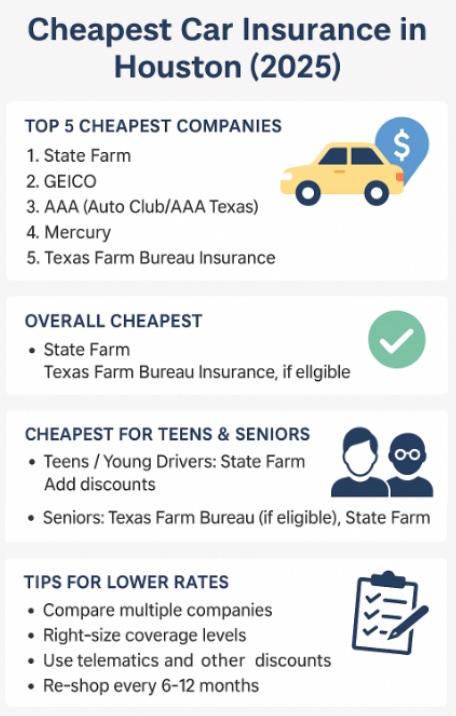Cheapest Car Insurance in Houston
Company Trusted For Over 25+ Years*

Call us 1-855-371-6683
Company Trusted For Over 25+ Years*
The average cost for a full coverage car insurance policy in Houston, Texas is $2,378, or $198 a month. This makes Houston right in line with the national average for premium coverage. However, for those drivers looking for the absolutely cheapest car insurance in Houston, state minimum rates can be found under $39 a month for qualified drivers.
Whatever type of coverage you need, you can save hundreds on Houston auto insurance by taking a disciplined and strategic approach. This guide will help you do that. You’ll find the five companies that most consistently deliver the cheapest car insurance prices with low deposits in Houston and one carrier that’s the overall cheapest for the general public.

For the broadest slice of Houston drivers, State Farm is the best starting point. It pairs consistently low base rates with a dense local agent network that understands Texas-specific coverage choices—like how to set bodily injury limits and whether to carry personal injury protection along with medical payments. Families like State Farm’s approach to adding a young driver, and the discount stack is meaningful: good-student, driver training, multi-vehicle, multi-policy, telematics, autopay, and more. The telematics program rewards smoother braking, limited late-night driving, and phone-free trips, which are all achievable habits in city traffic.
GEICO is the classic second quote and is often neck-and-neck with State Farm for clean-record commuters. The online process is quick, the app is simple, and raising deductibles or paying in full can push premiums well below the city average. GEICO suits drivers who prefer digital self-service and want straightforward coverage with minimal add-ons. It’s also a strong comparison point for households keeping older vehicles on full coverage while staying price-conscious.
AAA operates through regional clubs, and the Texas affiliate has been competitive around Houston—especially on full coverage. Many households already carry AAA for roadside assistance, so bundling auto insurance can be convenient. Add a home or renters policy, and the combined cost can fall further. AAA appeals to drivers who value live phone support and like the travel and towing perks that come with membership.
Mercury’s pitch is simple: keep essential protections and pay less for them. It frequently undercuts the metro average while offering a usage-based program that rewards predictable commutes and calm driving habits. If you have a minor speeding ticket or a small at-fault accident, still get a quote—some carriers treat light blemishes more gently than others, and Mercury is often competitive in those cases. The overall vibe is clear pricing without fluff.
TFB requires a modest Farm Bureau membership, but many Houston drivers find the savings justify the extra step. It’s known for straightforward claims handling, responsive local agents, and sharp pricing for clean records on full coverage. Because it’s not always top-of-mind for newcomers who grew up with national brands, TFB can be a “hidden bargain.” If you’re comfortable joining the Farm Bureau, include it every time you shop.
Bonus if you’re eligible: USAA routinely posts some of the lowest prices in the metro for active-duty military, veterans, and qualifying family members. If you qualify, never skip a USAA quote.
If you want one recommendation that’s usually the cheapest – or extremely close – for the general public, State Farm is your baseline. It’s rarely far from the bottom of the price list, works well for singles and families, and offers discount programs that are realistic to maintain in everyday Houston driving. If you’re Farm Bureau-eligible and don’t mind the membership step, Texas Farm Bureau Insurance can be even cheaper on full coverage. The smart play is to quote both on the same day and hold coverages identical so you can compare apples to apples.
Insuring a teen can feel like adding a second car payment. New drivers lack experience and are overrepresented in severe crashes, which pushes premiums up. You can’t change the actuarial reality, but you can tackle the price from several angles.
Start with State Farm. Its “good student” discount, driver-education credit, multi-vehicle pricing, and a telematics program that stacks effectively can really help you save. Keep the teen rated on the household’s least-expensive vehicle when possible, and review whether “student away at school” rules or limited-use designations apply. Add quotes from GEICO and Mercury; either can jump into first place for families that drive fewer miles, accept higher deductibles, or have older cars where comprehensive and collision can be tuned.
Drivers in their sixties often enjoy excellent rates thanks to long, clean histories and predictable mileage. Texas Farm Bureau Insurance regularly shines for this group (membership required). State Farm and GEICO frequently compete for second place. Seniors should revisit medical payments or personal injury protection, confirm rental reimbursement for road trips, and decide whether collision still makes financial sense on older vehicles with low market value.

Texas requires 30/60/25 liability: $30,000 bodily injury per person, $60,000 per accident, and $25,000 property damage. Those are legal minimums, not recommendations. In a city full of expensive vehicles and repair shops, it’s easy to exceed $25,000 in property damage with a single crash. If your limits run out, you’re personally responsible for the remainder. Many Houston drivers choose higher limits—often 100/300/50 or more—so a serious claim doesn’t become a personal finance problem.
This table illustrates the critical difference between the bare legal minimums and the recommended coverage levels for adequate protection in Houston:
| Coverage Type | Texas Minimum Requirement | Recommended Baseline for Houston | What It Protects |
|---|---|---|---|
| Bodily Injury Liability (per person) | $30,000 | $100,000 | Others’ medical costs if you cause a crash |
| Bodily Injury Liability (per accident) | $60,000 | $300,000 | Total for all others injured in a crash you cause |
| Property Damage Liability | $25,000 | $50,000+ | Damage you cause to others’ vehicles/property |
| Uninsured/Underinsured Motorist | Not Required | Match your liability limits | Your medical bills if hit by an uninsured driver |
| Comprehensive & Collision | Not Required | With a deductible you can afford | Damage to your own vehicle from crashes and other events (theft, hail, etc.) |
State Farm is the most reliable low-cost starting point for the general public. If you’re eligible for Texas Farm Bureau Insurance, it can be even cheaper—especially for full coverage.
Decide on one coverage setup and get prices from at least three carriers the same day. Start with State Farm and GEICO, add Mercury or AAA, and include TFB or USAA if you qualify.
Keep grades up for the good-student discount, complete driver education, enroll in telematics, apply the “student away at school” rule when applicable, and rate the teen on the least-expensive vehicle.
Pick the highest deductibles you can comfortably pay from savings—often $500 or $1,000. Do not drop comprehensive; hail and flood risk are real.
Yes. It protects you and your passengers when another driver has too little insurance or none. Matching those limits to your liability limits is a smart, affordable move.
If Texas Farm Bureau Insurance quotes a materially lower price, the modest membership fee usually pays for itself many times over. Compare the total annual cost after fees.
Every 6–12 months and after big life changes. Rates move, discounts expire, and your situation evolves. A quick comparison can uncover meaningful savings.
A balanced setup is at least 100/300/50 liability, comprehensive, and collision with deductibles you can afford, uninsured/underinsured motorist at the same limits, and medical payments or PIP. That mix addresses Houston’s traffic, weather, and repair costs without leaving major gaps.
Although rates have been going up in recent years, it’s still possible to get cheap car insurance in Houston, Texas. The reality is, Houston is an expensive place to insure a car, but it rewards shoppers who use a plan.
Start your quote comparison shopping with State Farm and GEICO, add Mercury and AAA, and include Texas Farm Bureau Insurance and USAA if you’re eligible. Keep coverages identical, tune deductibles to your budget, say yes to telematics, stack every legitimate discount, and re-shop on a schedule.
By taking advantage of these tips and taking a disciplined approach, many drivers can find the cheapest car insurance in Houston for the coverage they need that fits their budget. Start your online quote now and see how easy it is to save with direct rates.